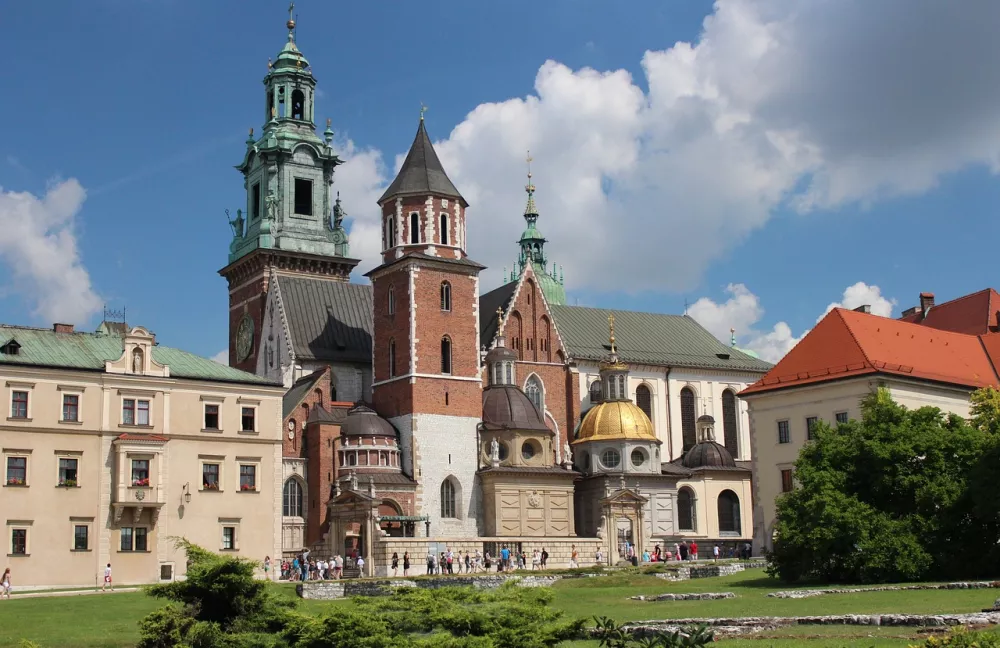Krakow - guide 
Poland's second largest city will enchant you with its medieval charm – from the majestic Wawel Castle to the vast medieval market square. And if it seems to you that history breathes on every corner, you are right. The Old Town of Krakow was even included in the very first UNESCO World Heritage List. But Krakow is not only about monuments. Stroll through the Jewish quarter of Kazimierz, taste an obwarzanek (something between a bagel and a pretzel), listen to the famous trumpet call from the tower of St. Mary's Church.
Sights and attractions - What should you visit in Krakow? The Main Market Square, the Wawel Royal Castle, the Kazimierz district or the Barbican...
Accommodation - Where to stay in Krakow? In the historic center or in the countryside outside the center? In a luxury hotel, apartment or guesthouse?
Typical food and drinks - What you should try in Krakow - the ubiquitous obwarzanek, zapiekanka or maybe poppy seed.
Practical tips - Learn more about local transport, customs and the best time to visit the city here.
Weather - What temperatures and precipitation will greet you in the four seasons in Krakow?
Celebrities - What famous personalities lived and worked in Krakow.
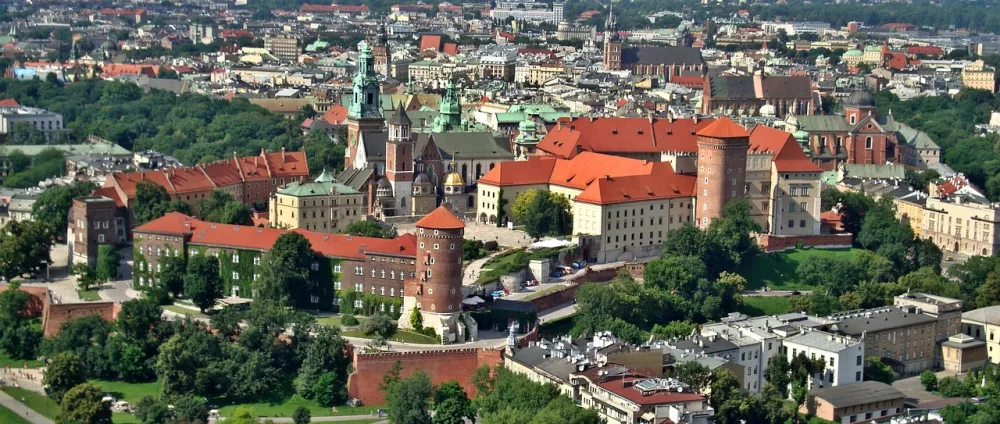
Krakow, the second largest city in Poland, has a population of approximately 770,000.
Krakow is located in the south of Poland, on the Vistula River. It represents the capital of the Lesser Poland Voivodeship.
Krakow was the capital of Poland from 1038 to 1596. Its history dates back to the 7th century, making it one of the oldest cities in the country.
The historic center of the city, including the Wawel Royal Castle, the Main Square (Rynek Główny) and the Kazimierz Jewish Quarter, is a UNESCO World Heritage Site.
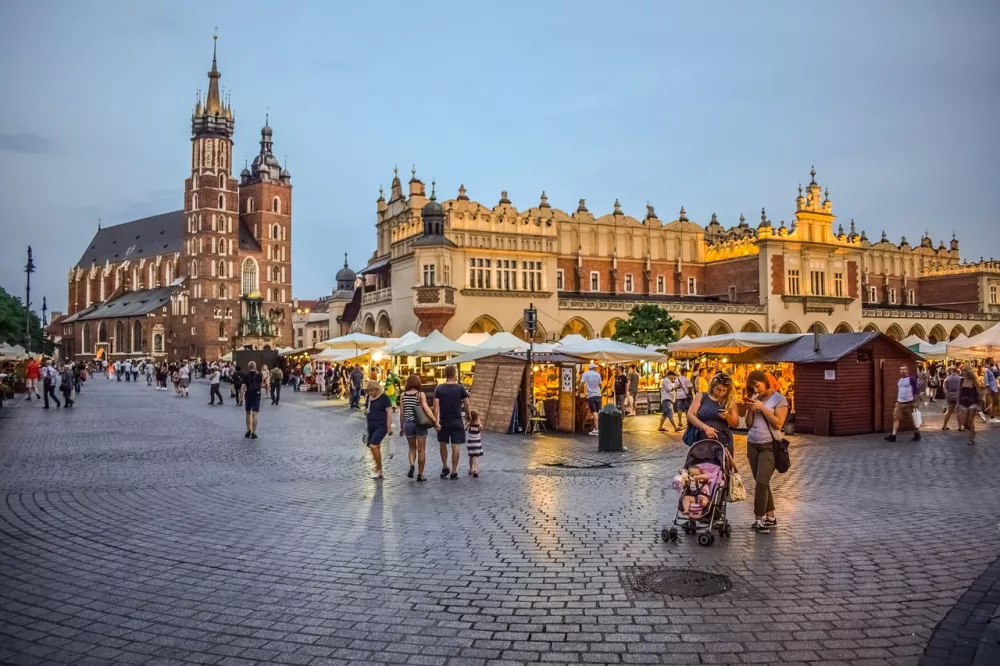
Krakow is a major economic center, known for its developed tourism industry, IT sector and educational institutions.
The city attracts a lot of international investment and is home to many multinational companies, such as IBM, Motorola Solutions and Dropbox.
John Paul II International Airport (Kraków-Balice) provides connections to many European cities. Direct flights fly to London, Rome, Frankfurt and many other destinations. The main railway station (Kraków Główny) is also an important transport hub.
Krakow is one of the most visited tourist destinations in Poland. It attracts millions of visitors every year thanks to its historical monuments, cultural events and rich gastronomy.
The proximity of the Wieliczka Salt Mine and the Auschwitz-Birkenau Memorial makes Krakow a starting point for visiting these important places.
Krakow hosts many cultural festivals and events, including the Etiuda&Anima International Film Festival, the Jazz Festival and the Jewish Culture Festival, which takes place at the turn of June and July.
Sights and attractions
Wawel Royal Castle (Zamek Królewski na Wawel) - The historical residence of Polish kings and a symbol of Polish statehood. Here you can see the royal chambers, the coronation cathedral and the treasury with the crown jewels. According to legend, a cruel dragon lived under the castle, which was defeated by the clever craftsman Skuba by giving him a sheepskin filled with sulfur. After eating it, the dragon drank water from the Vistula and exploded. In memory of this legend, a copper statue of a dragon stands under the castle, which periodically spits fire
Address: Wawel 5, Krakow.
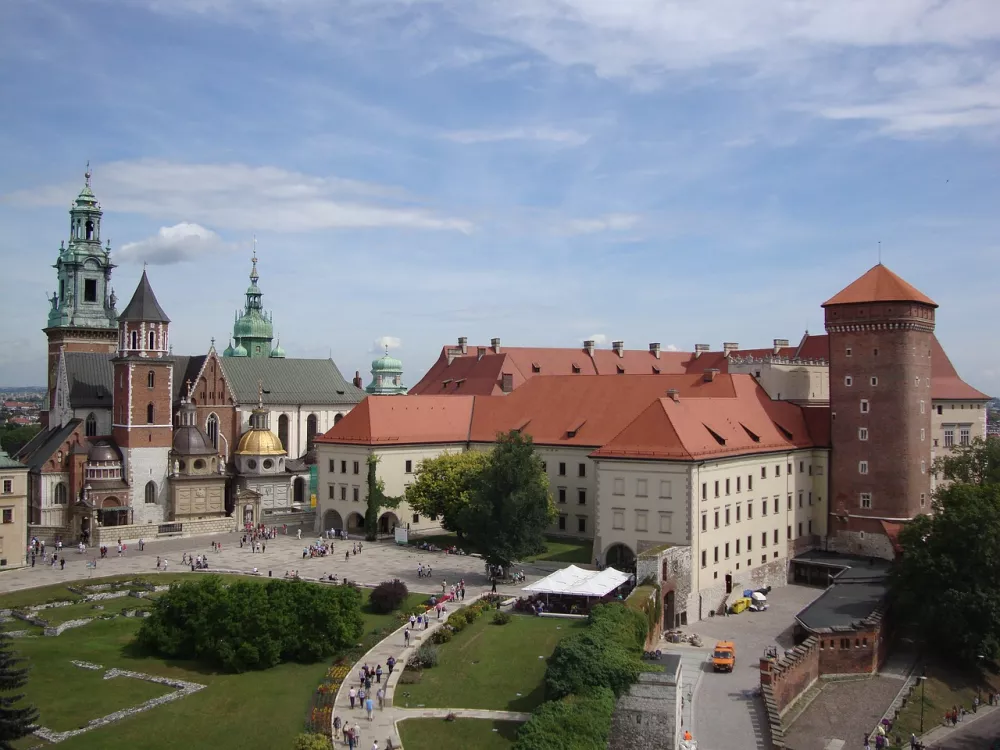
Main Square (Rynek Główny) – One of the largest medieval squares in Europe, measuring approximately 200 x 200 meters. You will find many important buildings here, including St. Mary's Church, the Town Hall Tower and the Cloth Hall. Beneath the square you can visit the extensive underground museum Rynek Underground, which offers archaeological exhibitions on an area of over 6,000 m².
Address: Rynek Główny, Kraków.
Marian Church (Kościół Mariacki) - A Gothic church known for its magnificent altar by Veit Stoss. The two towers of the church are not of equal height – according to legend, they were built by two brothers, one of whom killed the other out of jealousy so that his tower would not be higher. Every hour, the famous trumpet signal, the so-called Hejnał mariacki, is sounded from the higher tower.
Address: Plac Mariacki 5, Kraków.
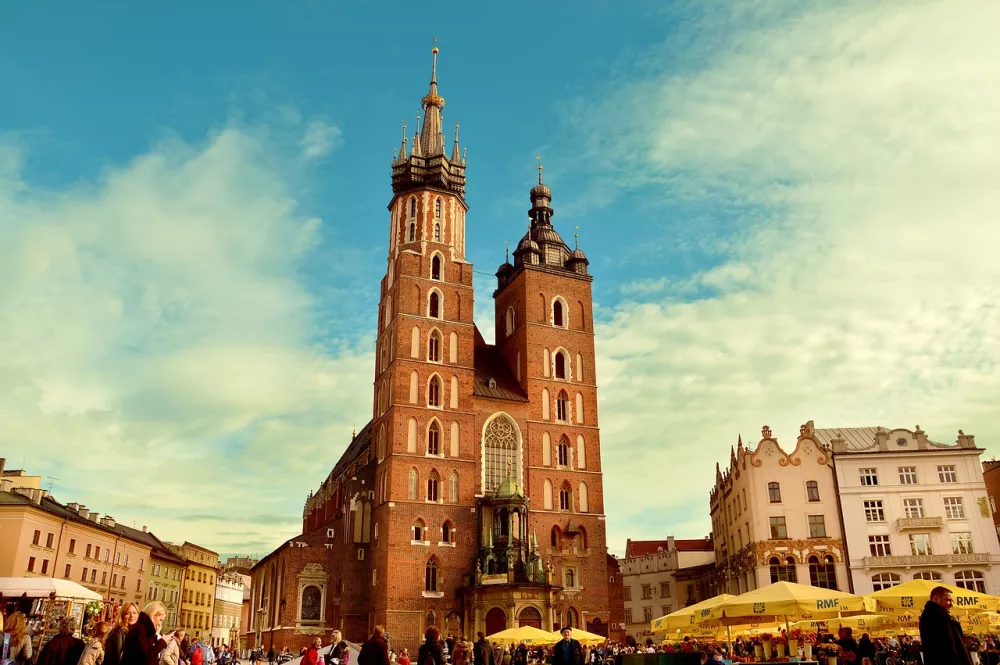
Sukiennice Market - The historic market hall on the Main Market Square. The name "Sukiennice" comes from the word "sukno = cloth" because it was originally used to sell mainly expensive fabrics and cloth imported from England and Flanders. Today, the market hall's ground floor houses stalls selling souvenirs, amber jewelry, and traditional Polish products, while the upper floor houses the Gallery of 19th-Century Polish Art. The building is also a UNESCO World Heritage Site.
Address: Rynek Główny 3, Kraków.
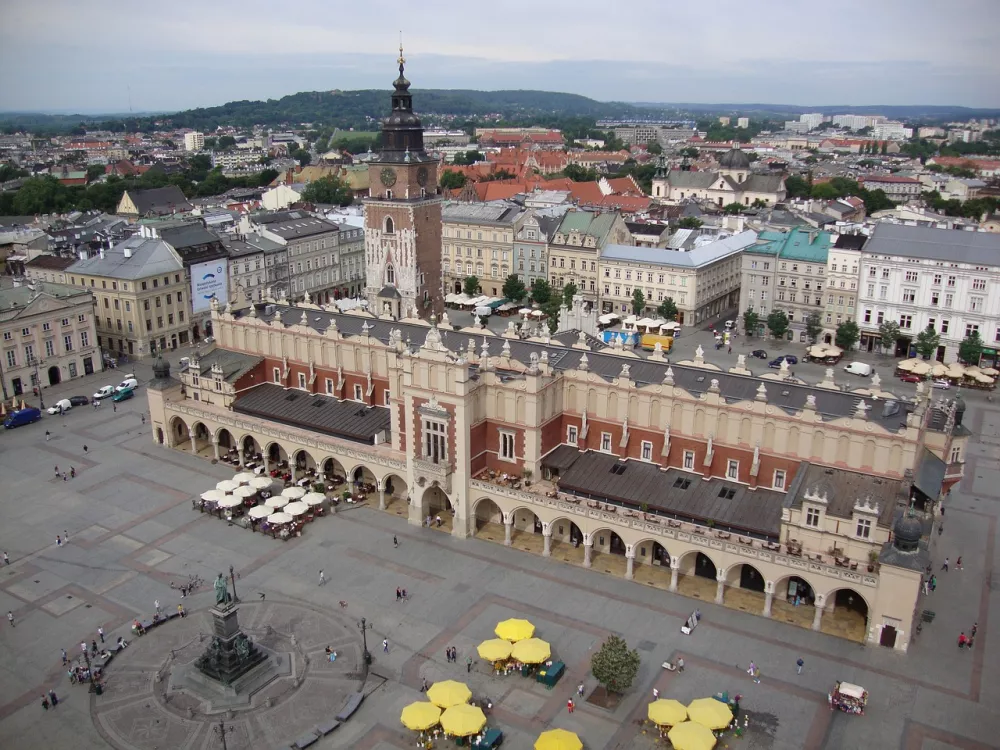
Kazimierz – The historic Jewish Quarter of Krakow, which was a separate city from the 14th century and later became part of Krakow. It is here that you will find the oldest surviving synagogue in Poland - the Old Synagogue from the 15th century, many other synagogues and also the location where the famous film "Schindler's List" was filmed.
Address: around Szeroka Street, Krakow.
Barbican - The Gothic defensive structure formed part of the city walls. The circular fortress with walls more than three meters high and seven towers was built in 1498–1499 to protect the city from Turkish raids. Today it serves as a museum and occasionally hosts various cultural events.
Address: Szeroka Street area, Kraków.
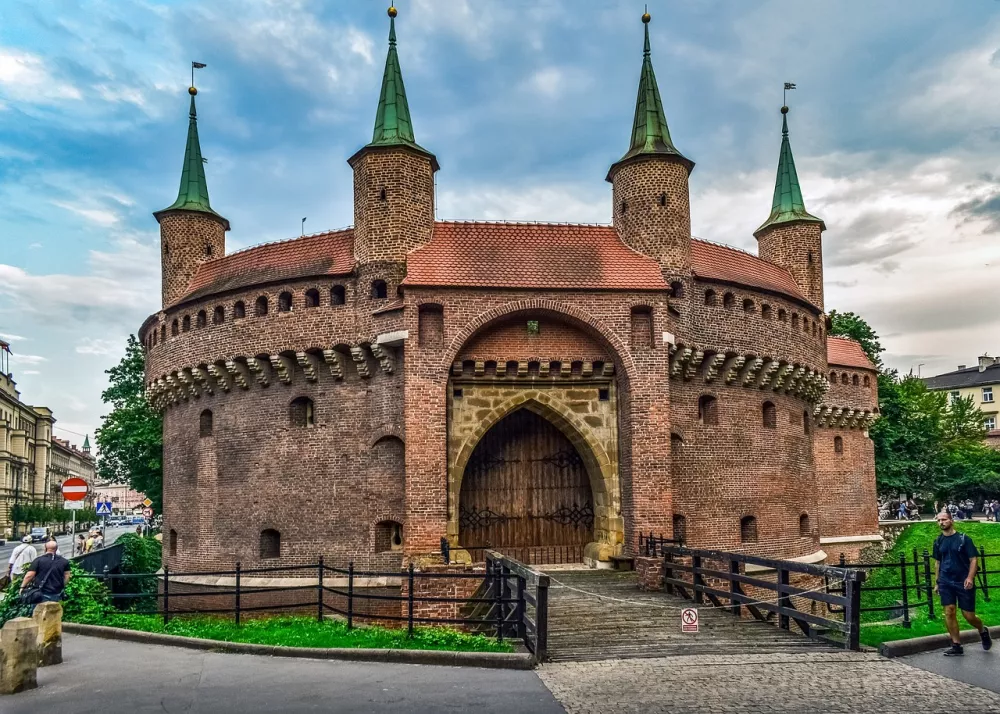
Jagiellonian University (Uniwersytet Jagielloński) - The second oldest university in Central Europe, founded in 1364. Its most famous students included Nicolaus Copernicus, who studied astronomy there, and Karol Wojtyła (later Pope John Paul II). The oldest surviving university building is the Collegium Maius, a significant Gothic monument, now open to the public.
Address: Gołębia 24, Kraków.
Florian's Gate - The only surviving of the original eight medieval city gates of Kraków. It was built in the early 14th century and served as the main northern entrance to the city. It measures over 34 meters and is decorated with a statue of Saint Florian, the patron saint of firefighters and protector of the city. The gate was part of the so-called Royal Route, along which the coronation processions of Polish kings passed towards Wawel.
Address: Floriańska 57, Kraków.
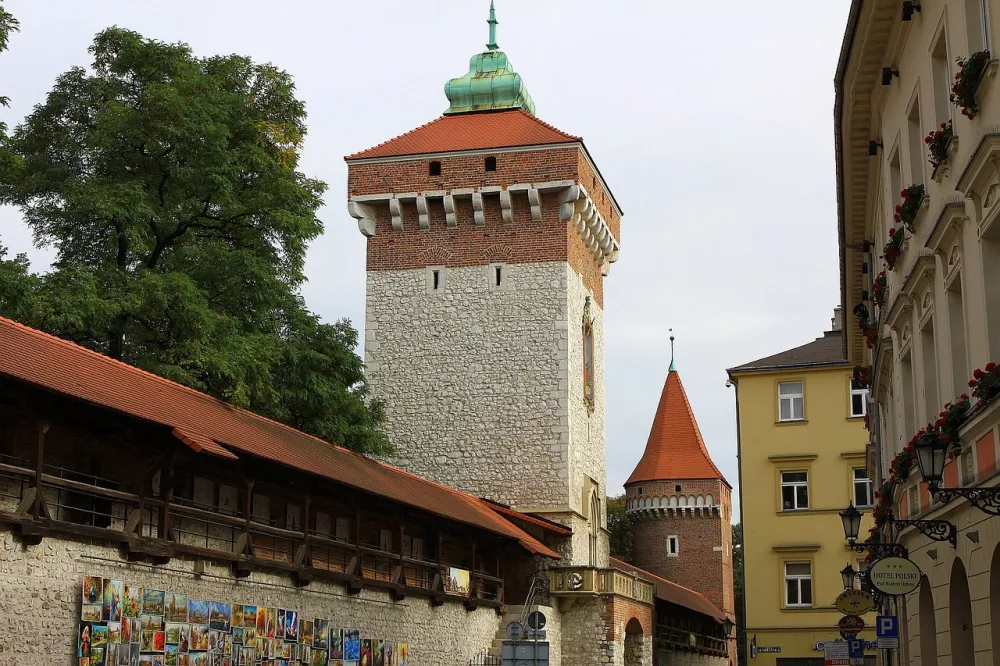
Auschwitz-Birkenau Museum – Holocaust Memorial and Museum, located about 70 km west of Kraków. The museum houses more than 100,000 objects and archives, including 150 preserved buildings and around 300 ruins, such as the remains of the gas chambers and crematoria in Birkenau. Among the most important and moving exhibits are the personal belongings of prisoners, such as shoes, suitcases, clothes, jewelry and dolls. These objects testify to the suffering of the deported people and to the attempts to maintain their humanity in the inhuman conditions of the camp.
Address: Więźniów Oświęcimia 20, Auschwitz.
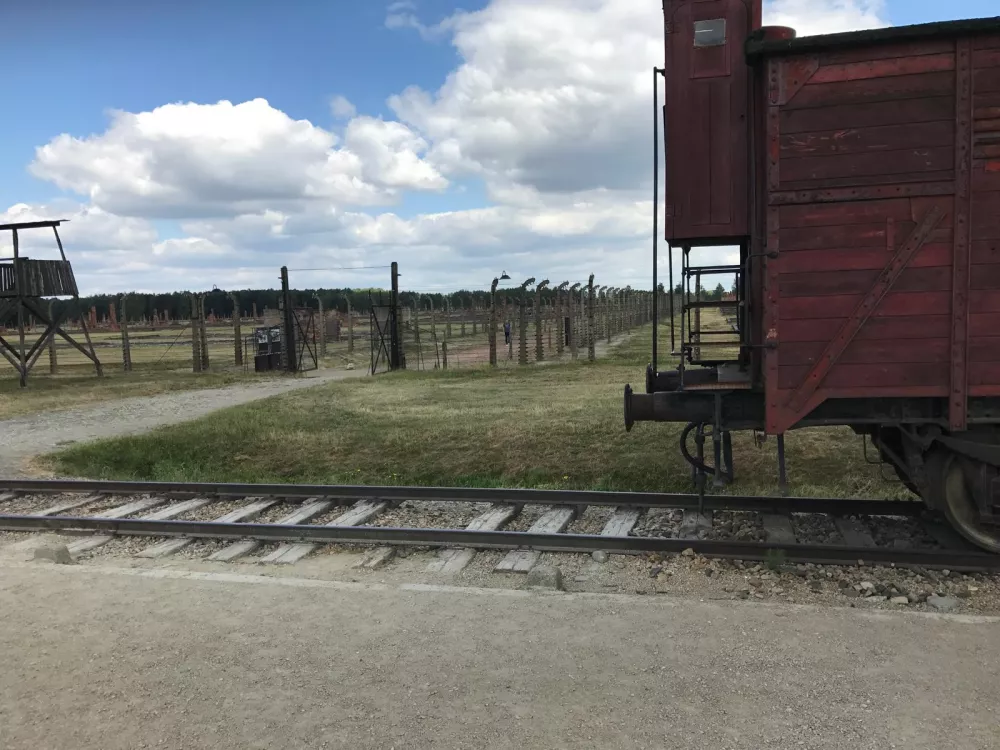
Wieliczka Salt Mines (Kopalnia Soli Wieliczka) - A unique underground world with a lake, a chapel and statues carved from salt. Located about 10 km southeast of Krakow, it is one of the oldest and most famous salt mines in the world. The mine is up to 327 meters deep and its underground passages and chambers measure more than 287 kilometers in total. The mine has been on the UNESCO World Heritage List since 1978 and is visited by over a million people annually.
Address: Daniłowicza 10, Wieliczka.
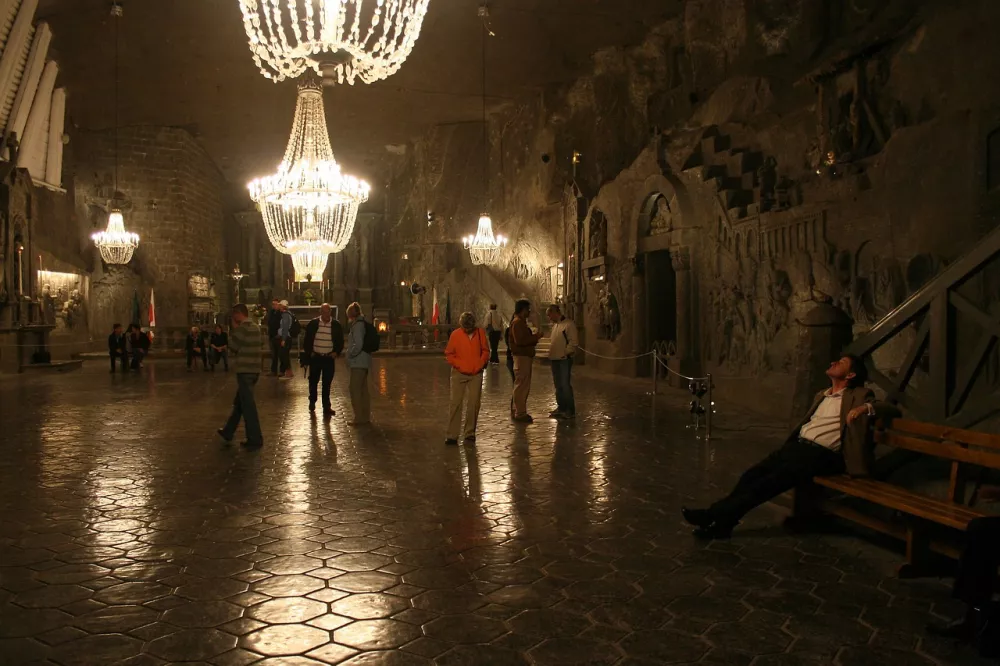
Accommodations
In Krakow, you can choose from more than 4,300 different accommodation capacities, from luxury accommodation to cheapest ones. The largest part of the offer consists of apartments, followed by hotels, hostels, guesthouses and villas.
You can indulge in real luxury at the 5* Bachleda Luxury Hotel Krakow MGallery Hotel Collection in the center of the Old Town. Guests can relax in the hotel spa with an indoor pool with hydromassage and water jets, dry sauna, caldarium or in the fitness center. It's not missing here either restaurant, bar, garden or terrace.
Lovers of boutique accommodation will definitely like the 3* Merci Boutique Hotel. The hotel offers accommodation with a garden, free private parking, a shared lounge and a restaurant, as well as concierge services, a 24-hour front desk, airport transfers, a kids' club and free Wi-Fi in all areas. You will find it 4 km from the city center.
If you prefer to stay in an apartment with your own kitchen, check out WillaWawel - LoftAffair Collection in the historic Old Town district. The 24-hour reception can arrange airport transfers upon request.
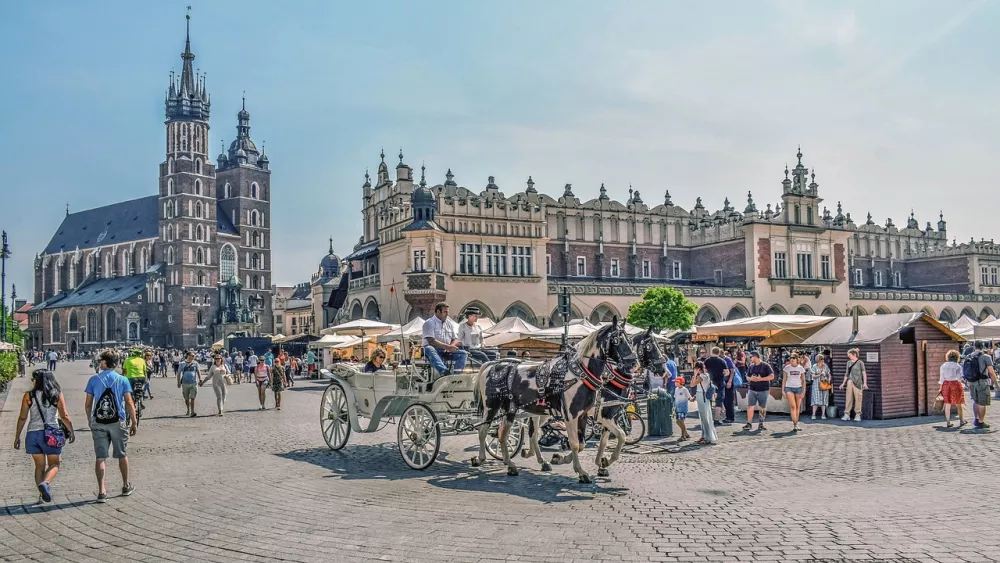
If you prefer cheaper apartments outside the city center, you might like the Apartament A2D Kraków apartments, which are located about 5 km from the center. What do apartments for 2-4 guests offer? Accommodation with garden, terrace, free private parking, shared lounge and kitchen.
The classic guesthouse about 5 km from the center of Pensjonat Pola offers a garden with barbecue facilities, a shared lounge or luggage storage. You can stay in a double room or in a studio or in a wheelchair-accessible room.
Pleasant accommodation in a beautiful villa with a large garden in the city center is offered by the 3* guesthouse U Pana Cogito. In the local restaurant you can taste specialties of Polish cuisine, in the morning they prepare breakfast here. The accommodation is located a short distance from the Wawel Royal Castle. You can park directly on the premises for an additional fee.
For a complete offer of accommodation in Krakow, we recommend using A-HOTEL.com or Booking.com.
Typical food and drink
Krakow is known for its rich gastronomic tradition, which combines elements of Polish cuisine with regional specialties. In addition to typical Polish dishes such as pirogi, bigos or žurek, which we wrote about in the article about Warsaw, you should not miss:
Obwarzanek krakowski - A traditional Kraków baked ring similar to a pretzel, sprinkled with salt, sesame or poppy seeds. You can find this popular street food on practically every corner in Krakow.
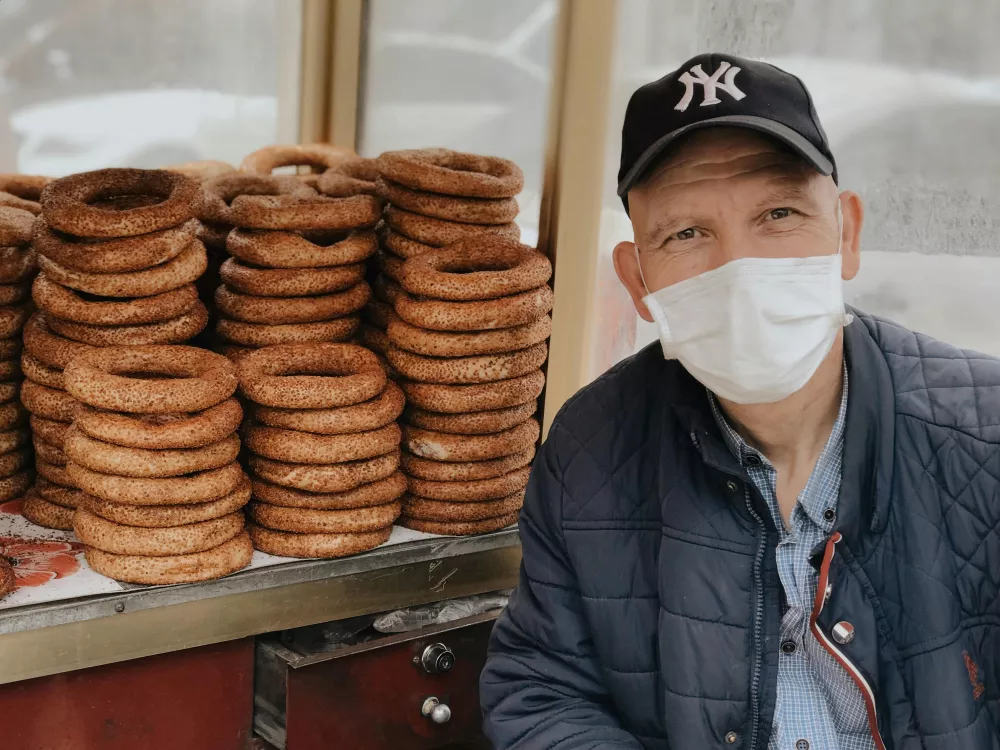
Zapiekanka - A baked baguette with various ingredients is one of the popular local street foods.
Kiełbasa - Polish sausages, grilled or smoked. There are many varieties, each with its own unique flavor.
Placki ziemniaczane - Potato pancakes, often served with various sauces or sour cream.
Makowiec - Poppy strudel, a traditional Polish dessert made from yeast dough filled with a sweet poppy filling.
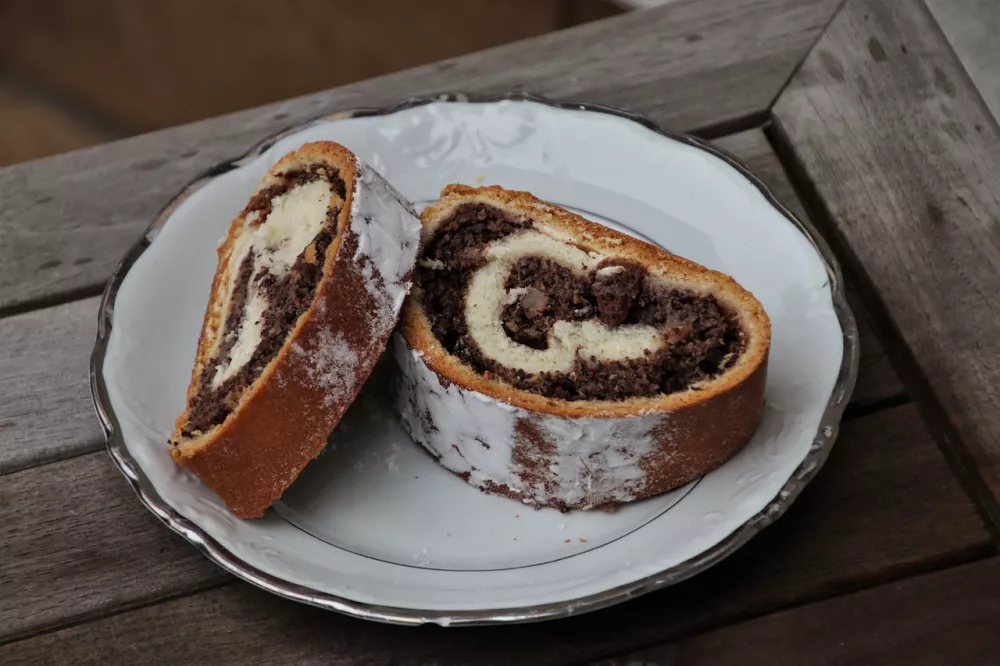
Sernik - Polish cheesecake, popular throughout the country and often containing raisins or fruit.
Krupnik – In addition to the popular beer and traditional vodka, you can also try krupnik, a honey liqueur, often served as a digestive. It has a sweet and spicy taste.
Tea - Tea is very popular in Poland, often served with lemon or honey. Especially in the winter months, hot tea with added fruit or spices is drunk a lot.
Practical advice for the trip
In spring (May and June) and autumn (September and October) you can avoid the tourist crowds and enjoy the pleasant weather here. The city also has its charm before Christmas – you can enjoy the Christmas markets on the Main Square.
For easy movement around the city, use trams and buses. You can buy tickets in advance from machines at stops or directly in the cars, and now also via mobile applications. If you are staying here for longer, buy one-day or multi-day tickets. If you have enough time, explore the city center with its main sights on foot. You can also rent a bike and ride along one of the well-maintained cycle paths. You can also take a boat ride on the Vistula River.
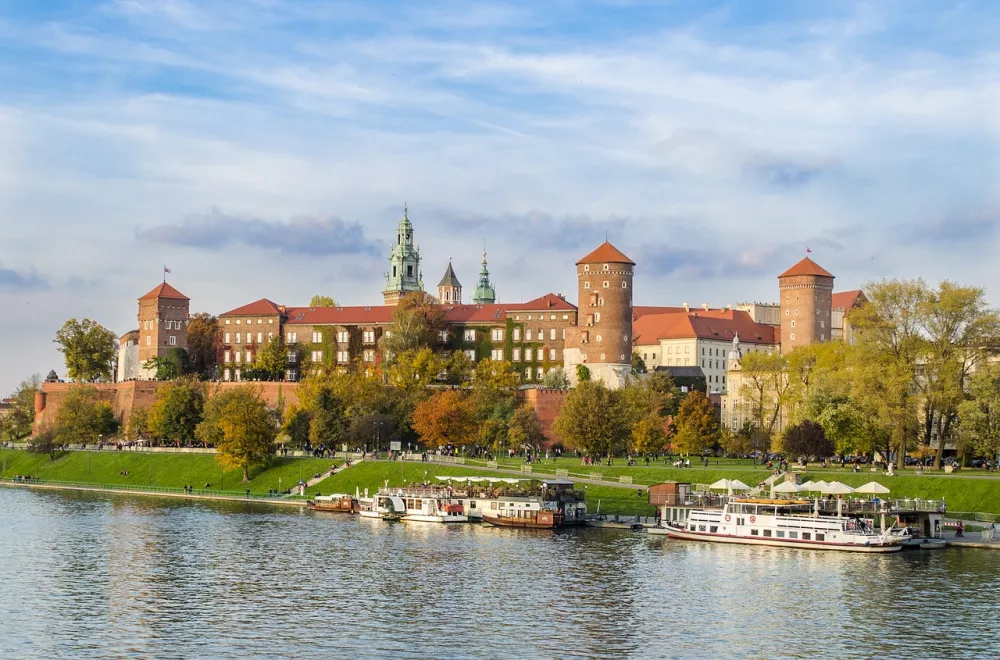
Try traditional Polish dishes in local restaurants such as pierogi, bigos and żurek. From the street snacks, we recommend the ubiquitous obwarzanek or zapiekanka. Coffee is best enjoyed in one of the cafes in Kazimierz. They offer a great atmosphere and excellent coffee.
Krakow is one of the safe cities, but as in any big city, be careful and keep an eye on your personal belongings, especially in crowded places or on public transport.
Most shops and restaurants accept cards, but it's good to have cash for smaller purchases. You can find ATMs all over the city.
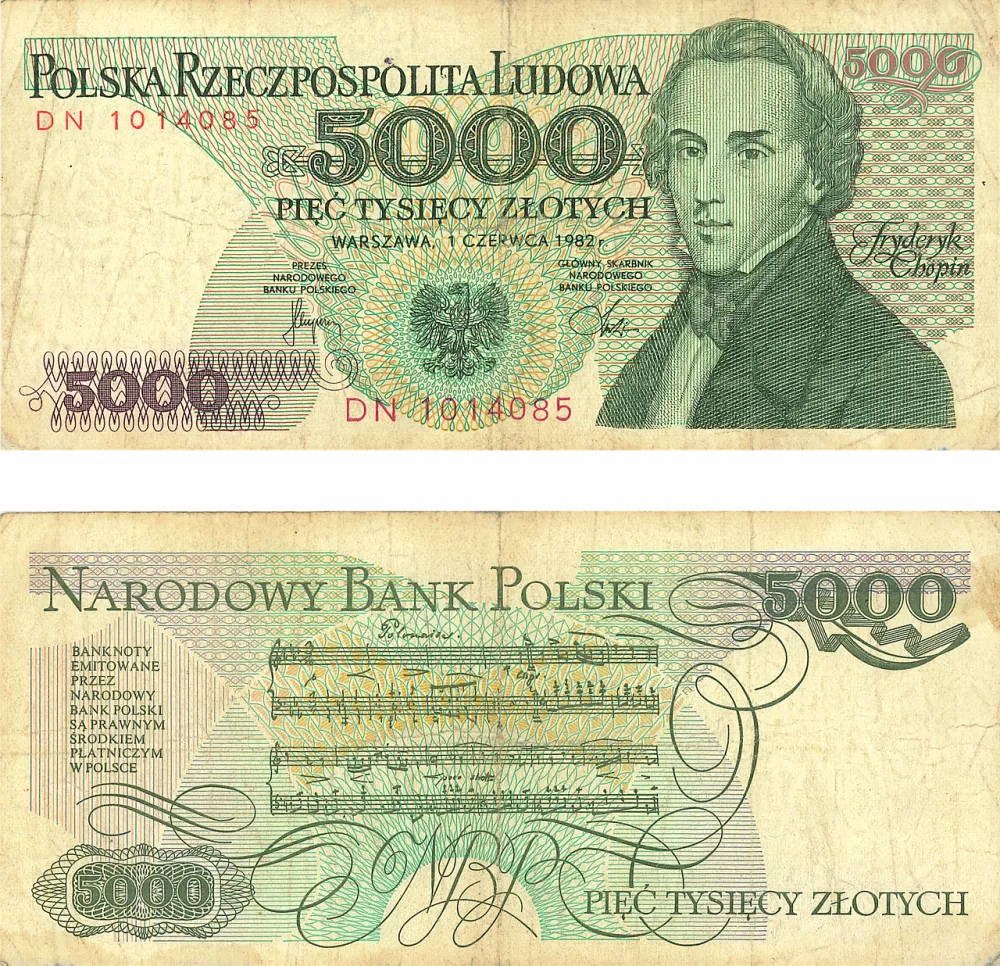
Polish is the official language, but many people, especially the younger generation, speak English. Learn a few basic Polish phrases that the locals will appreciate.
👍 Our tip: Zakrzówek Park offers a unique combination of nature, water and rocky viewpoints on the edge of the center of Krakow. The park was created on the premises of a former limestone quarry and today attracts with walking and cycling trails, picnicking opportunities and refreshment in the summer months. You can swim here in the beautifully clear water - if you want to go in the water, come early in the morning, because the interest is great and the capacity is limited.
Weather
Krakow has a mild continental climate characterized by four distinct seasons.
It rains most often in spring and summer.
Spring is characterized by changeable weather with temperatures ranging from 5°C in March to 20°C in May.
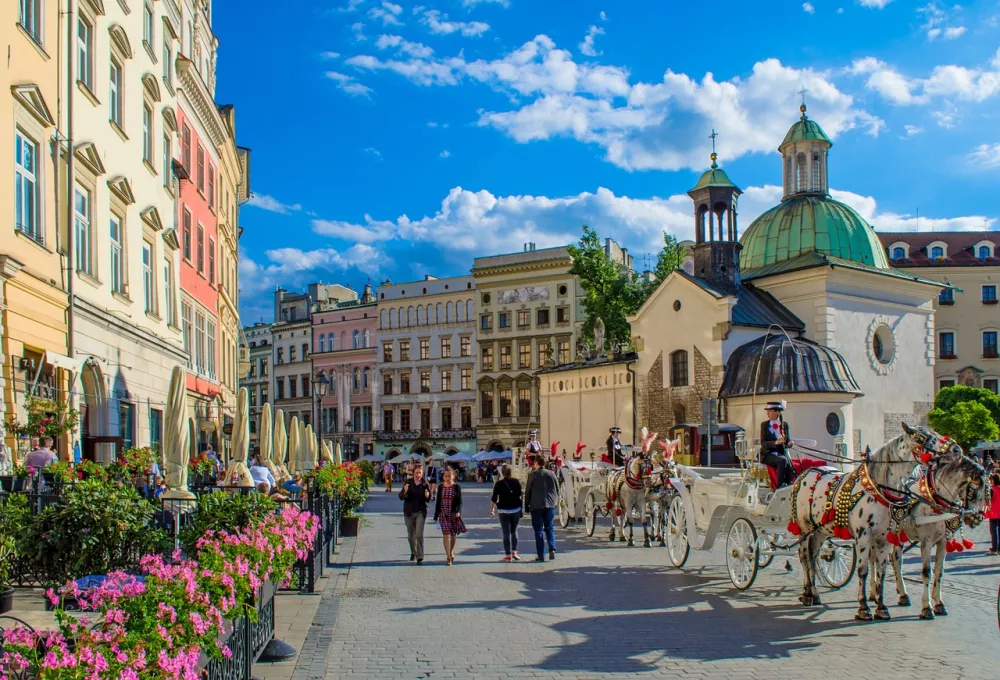
In summer, temperatures sometimes rise to 30°C. The sun often shines, but storms can also appear.
Autumn changes from a warm and dry September to a cold and wet November. Temperatures during autumn drop from 20°C to zero. The beautiful autumn atmosphere of the city is enhanced by colorful leaves.
Winter temperatures range from -5°C to 5°C. Frosty days are not an exception, especially in January. Sometimes it snows here. Prepare for short days and long nights.
Famous people
Jan Paweł II (Karol Wojtyła) (1920-2005) - First Polish Pope, formerly Archbishop of Krakow. He came from the town of Wadowice near Krakow, studied and worked in Krakow. He was canonized in 2014.
Queen Jadwiga (1373/4-1399) - Polish queen and saint. They crowned her in 1384. She became famous for her charitable work and support of the Jagiellonian University.
Nicolaus Copernicus (1473-1543) - A famous astronomer who studied at the Jagiellonian University in Krakow. He invented the theory of heliocentrism, which changed the view of the universe.
Jan III Sobieski (1629-1696) - King of Poland, who became famous for his military prowess and victory over the Turks in the Battle of Vienna in 1683. He studied at the university in Krakow and was also buried here in the Wawel Cathedral.
Adam Mickiewicz (1798-1855) - One of the most important Polish poets, whose statue stands on the Main Square in Krakow. Poles consider him a national poet.
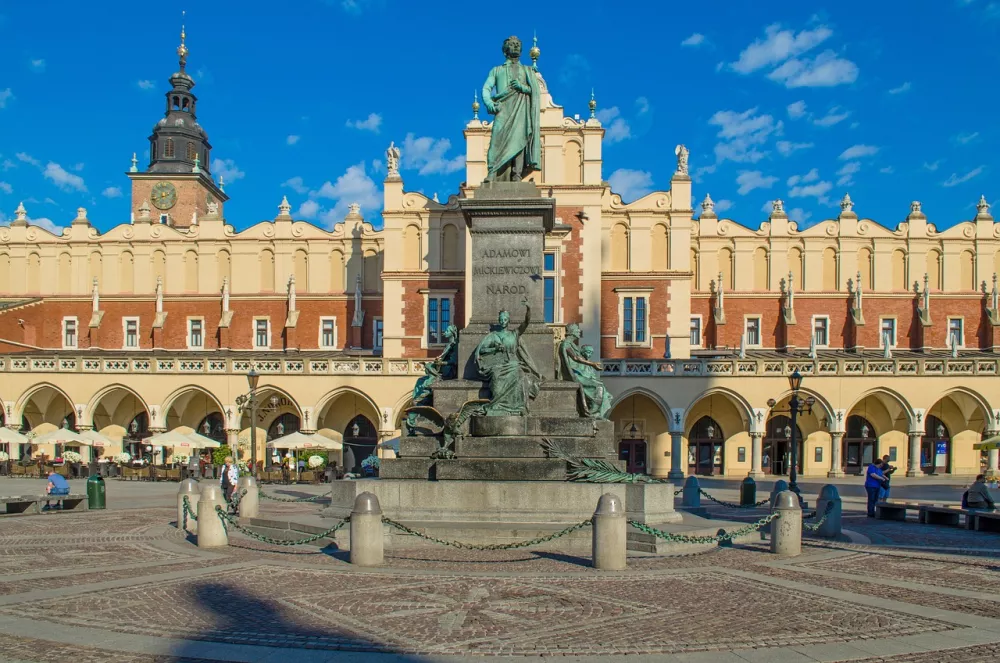
Stanisław Wyspiański (1869-1907) - Renaissance artist and playwright whose works include paintings, plays and designs for stained glass windows for St. Mary's Church. He was born and lived in Krakow, in his house today you can visit a museum.
Wisława Szymborska (1923-2012) - Polish poet and essayist who won the Nobel Prize for Literature in 1996. She lived and worked in Krakow.
Krzysztof Penderecki (1933-2020) - One of the most important composers of contemporary music who lived and worked in Krakow. His works are known all over the world.
